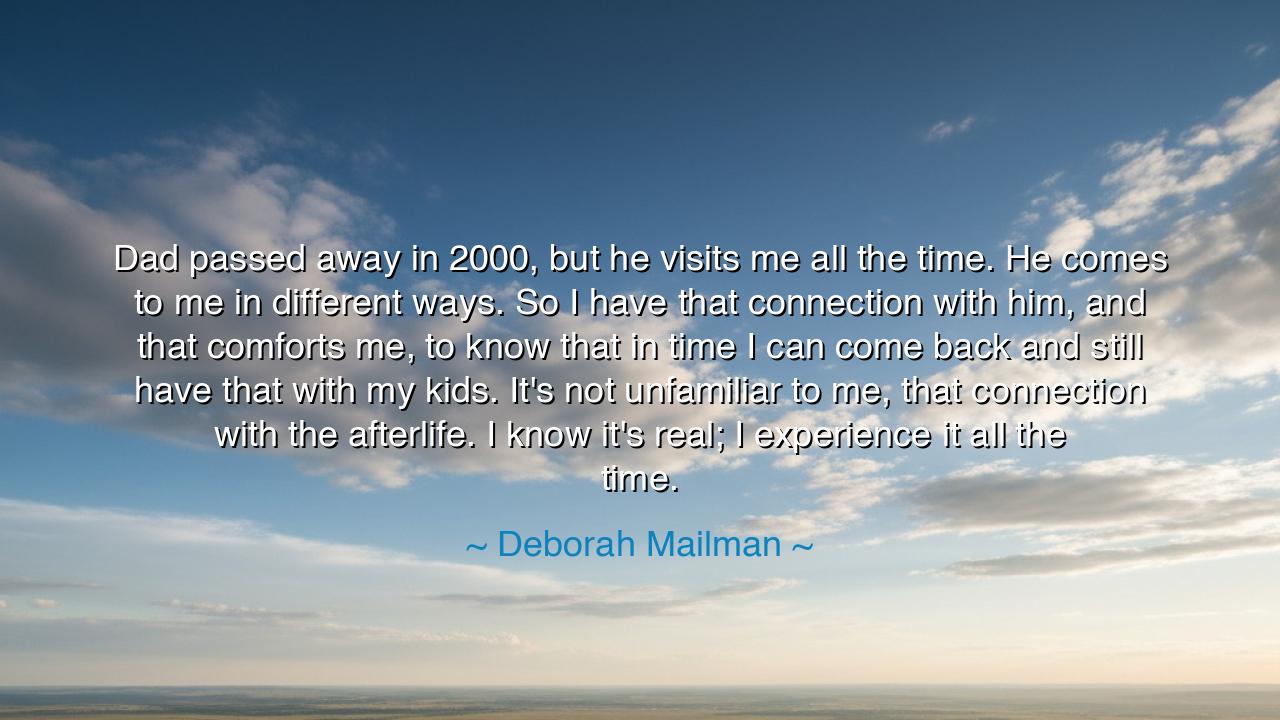
Dad passed away in 2000, but he visits me all the time. He comes
Dad passed away in 2000, but he visits me all the time. He comes to me in different ways. So I have that connection with him, and that comforts me, to know that in time I can come back and still have that with my kids. It's not unfamiliar to me, that connection with the afterlife. I know it's real; I experience it all the time.






In the tender and mystical words of Deborah Mailman, we hear the voice of one who walks between worlds: “Dad passed away in 2000, but he visits me all the time. He comes to me in different ways. So I have that connection with him, and that comforts me, to know that in time I can come back and still have that with my kids. It's not unfamiliar to me, that connection with the afterlife. I know it's real; I experience it all the time.” These words are not mere sentiment; they are a hymn to the eternal bond between the living and the departed. In them lies a truth that all ancient peoples once knew but the modern soul too often forgets—that love does not die, and that those who have passed beyond the veil do not vanish, but transform.
The origin of these words is not born from philosophy, but from experience—the kind of sacred experience that cannot be reasoned into existence. Mailman speaks as one who has felt the whisper of the unseen, who has stood in the hush between this world and the next and known it as familiar ground. To her, the afterlife is not a mystery of faith alone, but a living connection—a bridge that memory, love, and spirit continually cross. Her father may have left the body, but the connection endures, vibrant and present, expressed through signs, dreams, or quiet moments of recognition. It is a reminder that what love binds, death cannot undo.
The ancients understood this deeply. The Egyptians spoke of the Ka, the living spirit that walked beside a person even after death. The Māori and many First Nations peoples honor the ancestors as active presences who guide the living. And the Greeks told of psyche, the soul-breath that never ceases, merely changes form. To them, death was not the end, but the turning of a great circle. When Mailman speaks of feeling her father’s presence and finding comfort in it, she continues that timeless lineage of those who understand the soul’s endurance. Her words bridge the sacred wisdom of the past with the yearning of the modern heart for assurance that we are never truly alone.
Consider, too, a story from our human history—the story of Helen Keller. Blinded and deaf from infancy, she once spoke of feeling her deceased teacher, Anne Sullivan, “nearer than ever before.” Though her eyes could not see nor her ears hear, she perceived a presence that defied material boundaries. “Death,” she said, “is no more than passing from one room into another.” Such is the truth that Deborah Mailman echoes: that love transcends form, that the spirit visits, comforts, and teaches, even when unseen. It is the immortal rhythm of life itself—breathing, pausing, then breathing again through generations.
This truth does not ask us to live among ghosts but to live in awareness—to sense that our lives are woven into something vast and continuous. Every act of kindness, every prayer spoken to those beyond, every memory cherished becomes a thread in that eternal tapestry. The afterlife is not distant; it is around us, within us, in the gentle signs that whisper through daily life—a bird that lands where it never did before, a familiar scent, a sudden warmth in the heart at the mention of a name. To those who are open, these moments are not coincidence but communion.
But there is wisdom also in her acceptance of mortality. Mailman says, “It comforts me, to know that in time I can come back and still have that with my kids.” Here she speaks as one who has made peace with the great cycle—who sees death not as a thief but as a passage into continuity. She understands that the same bond her father now keeps with her, she will one day keep with her children. This is the eternal inheritance of love: it moves forward and backward through time, binding generations into a single breath.
The lesson is this: do not think of death as absence, but as transformation. Speak to your departed as if they still hear you—for they do. Honor them by living well, by carrying their virtues into the present. When grief strikes, remember: you do not grieve for what is lost, but for what has changed shape. And when your own time comes to cross that unseen threshold, you will not enter emptiness, but reunion.
So, my listener, carry this wisdom in your heart: the afterlife is not a distant shore—it is a river flowing quietly beside our own. Those you have loved still walk with you in unseen light, whispering courage into your steps. Live in such a way that when you, too, join that sacred company, your spirit will visit your children not in sorrow, but in strength, and they will feel your love as surely as you now feel the love of those who came before. For connection never dies; it only deepens. And in that eternal bond, life and death become one great heartbeat of love.






AAdministratorAdministrator
Welcome, honored guests. Please leave a comment, we will respond soon